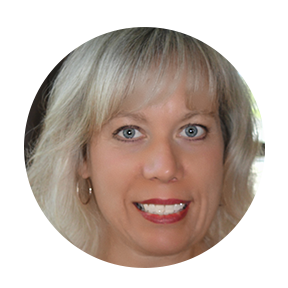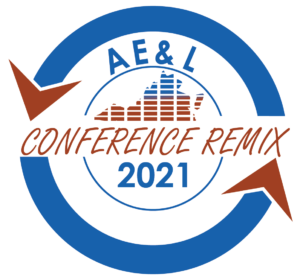Re-Envisioning the Conference Experience

by Katherine Hansen
“Let us take the relationships that we have strengthened, the new cross-regional initiatives we have started, the successful projects we have formed and presented on, the energy and synergy that we experienced, the challenges that we have accepted—and conquered—through this Conference ReMix and use them to guide our collective mission moving forward.”
Not more than a month after wrapping up the 2020 Adult Education and Literacy Conference in Harrisonburg, the pandemic hit. We had already done some pre-planning for 2021 and had reserved the same venue, The Hotel Madison, for the following spring. It quickly became very clear that conferences were most likely not going to take place in person for the foreseeable future so we at the VALRC started putting our heads together about what could be a meaningful alternative professional learning experience and networking opportunity for adult educators in Virginia. While we knew that we would have to work within a virtual environment, we pushed ourselves to innovate beyond trying to take the typical conference experience and place it online. What we came up with was the 2021 Adult Education and Literacy Conference ReMix—an innovative spin on a longstanding classic.
Design
The first thing that was important to us was to offer an experience that would be meaningful. We recognized very quickly that tacking on more virtual webinars to our educators’ calendars could be counterproductive to our mission as Zoom fatigue was already starting to become a reality. We were also cognizant that we needed to focus our efforts on the most pressing issues affecting our programs at this particular point in time. We determined that digital literacy and diversity were areas that most likely needed support as our programs and educators would have to move operations online and address the ever-increasing equity divide that was brought even more to the forefront by the pandemic. It was paramount in our decision-making that what we offered was not an “add” to our educators’ already full plates, but a supportive opportunity provided in a variety of ways that could help them with something that they were already facing.
We also wanted to model best practices as much as possible. We sought to demonstrate adult learning theories through action learning, self-directed learning, the peer-to-peer experience, in-depth exploration, evidence-based practices, culturally responsive teaching, and transformational learning. We also strived to create an engaging online learning experience for participants by utilizing multi-modal approaches and a variety of tools that we hoped would be utilized in each individual’s own instructional context after having been introduced through the ReMix.
We took inspiration from the idea of a flipped classroom and decided to flip our conference. Instead of conference attendees being presented to, we thought that we could “flip the script” and give participants the chance to impact their program(s) through a project-based learning community. Instead of three days like our in-person conference, we spread the components out over six months. We kept some parts of our standard conference format like keynote speaker plenary sessions and Think Tanks and mixed them with a statewide project-based team challenge where teams would instead do the presenting at a culminating finale showcase. The 2021 AE&L Conference ReMix was born.
Implementation
We began the Conference ReMix by issuing a challenge to our educators. We challenged them to form teams and work together to take on a shared adult education problem that they were trying to solve, a question that they wanted to answer, or an idea that they wanted to try. We urged them to incorporate one or both of the following into a learner-centered practice or work setting—respecting difference and diversity and integrating digital literacy/blended learning. Programs could bring their own team and designate their content area or propose a problem, question, or idea and seek members to join their team. Alternatively, individuals could sign up for a content area of interest and be assigned to a team. While this variety of choices took some planning and coordination by conference staff, the results were well worth the efforts. Cross-regional and cross-functional teams formed around common interests in tackling real issues that they shared.
To structure the team challenge, we adapted project-based learner (PBL) methodology so that educators could go through the project process themselves within a professional development context and become familiar with its components, terms, and practices. We hoped that this immersive exercise would encourage programs and instructors to offer PBL to their adult learners. We set up a timeline with periodic milestones—team formation; project setup; sustained inquiry; testing, application, and feedback; reflect, critique, and advise; showcase preparation; and evaluation. We provided guiding questions for each milestone and created a team website which allowed for communication among team members, between teams, and with conference support staff.
A key component of the team challenge success was the incorporation of peer coaches culled from our statewide teacher leader professional learning community (PLC). Participation in the teacher leader PLC is an ongoing opportunity for Virginia adult education practitioners to work with other teacher leaders from across the state to learn about coaching styles and culturally responsive teaching (CRT) methods in order to integrate those skills into practice and enhance opportunities for collaboration and mentorship within their programs. As a Conference ReMix peer coach, select teacher leaders were able to directly apply the coaching and CRT principles from their PLC while working with teams to guide members through the PBL process. The peer coaches were instrumental in keeping teams motivated and on task throughout their projects. They provided crucial support not only to their teams, but also to conference staff.
As previously mentioned, we wanted to try and keep some of the tried and true components that conference participants have grown to love in our AE&L Conference. We also recognized that not everyone would be able to participate in the team challenge so we wanted to have some offerings that anyone could attend yet still be related to the overall ReMix design. We planned for four periodic virtual plenary sessions with keynote speakers who could offer their expertise in some of the primary learning objectives we were aiming to achieve. Alicia Bolton with the Institute for Educational Leadership was our plenary kickoff keynote speaker in early October. From her experience leading the Minds that Move Us Initiative Adult Career Pathways Design Challenge, she set the stage and demonstrated in her keynote address Collaborate to Innovate what amazing things can be accomplished when teams work together and innovate.
A few months later, our next plenary session speaker was Daquanna Harrison of Elevation Educational Consulting Group . In her keynote address, Bringing Your ‘Whole Self’, Discussions on Diversity in Adult Education, she led participants through a powerful interactive examination of personal cultural development, organizational practices, and tools to support diversity in ideas, personnel, and teaching strategies. Together, participants expanded on ways to bring their ‘whole selves’ to the classroom while better serving diverse students.
The next plenary session presenter was Jorge Valenzuela of Lifelong Learning Defined. In his keynote address, Make Remote Learning Engaging for Students by Focusing on Project-Based Learning, he provided pro tips, resources, and actionable steps to help educators level up both virtual and face-to-face PBL units. He demonstrated how blended learning, career skills, equity, and social and emotional learning can work in tandem with academics.
Finally, the culminating event took place virtually over two days in mid-April. The AE&L Conference ReMix Team Challenge Showcase presented the work of ten teams providing actionable solutions for Virginia’s adult educators. Their presentations, which are highlighted in this issue of PROGRESS, were both educational and inspirational. In addition to a session about teacher leaders and peer coaches, the finale keynote address was brought by DJ Enferno of Mix Major Electronic Music School entitled Connecting to Create Emotion & Inspire Action. He engaged with attendees and led adult educators in a practice of identifying core values and articulating a unified mission through music using technology in an online environment.
Throughout the plenary sessions, multiple online tools and virtual methods to engage participants were modeled. As participants entered the online environment, staff used engagement strategies like playing music, posing questions in the online chat, and leading interactive activities to help make people comfortable communicating with each other. Multiple tools were used throughout sessions to offer a variety of modes for learning. Videos were created with Doodly, audience polls were conducted with Mentimeter, and collaborative discussion and feedback was encouraged through Padlet—to name just a few. Each session also offered time for Think Tanks where participants broke into randomized groups facilitated by the peer coaches. It was a time dedicated for reflection so that what was presented could be built upon with dialog among colleagues from across the state. It was our hope that this opportunity would stimulate ideas for application and generate mutual understanding and collaboration.
Result
Overall, response to this alternative conference format was positive. “I liked it better than in-person. It’s much more convenient,” said one conference-goer. “I liked the virtual conference due to the ability to stay home but still meet plenty of people around Virginia that volunteer, support, advocate, coordinate, manage, and teach in adult education” said another. From the team perspective, one member shared, “As a team, we were able to use the conference to motivate and direct our work, resulting in a product that had impact for our organization. Truly, ideas to concrete action through this process.” While some participants shared that they preferred meeting in person, one person pointed out that ”This format made the best use of virtual learning. Going forward, it would be good to have a blended approach.”
This suggestion is certainly worth consideration moving forward and we welcome hearing more about what our adult educators want and need for professional development in the coming months and new program year. For example, we would like to continue the work we started this year with Daquanna and Jorge. Learn about what is being considered and let us know your thoughts in this 2021 AE&L Conference ReMix Evaluation and Future Interest Survey.
They say that necessity is the mother of invention. This past year has thrown us all some curve balls and we in adult education have adapted and created new and exciting paths forward. Let us take the relationships that we have strengthened, the new cross-regional initiatives we have started, the successful projects we have formed and presented on, the energy and synergy that we experienced, the challenges that we have accepted—and conquered—through this Conference ReMix and use them to guide our collective mission moving forward. As many of our teams recognized in their project work, Virginia will be looking to adult educators to help get people back to work. We have come through this challenging year, stronger and more connected than ever before. I, for one, can’t wait to see what we adult educators in Virginia will accomplish next!
Virginia Moving Forward with Project-Based Learning
Project-based learning can be done at any level of your organization—at the program level, teacher level, and student level. Virginia has opportunities for each context. Here are a few examples.
Program Level
The 2021 Inaugural Cohort of the Leadership Excellence and Development Institute: Project-Based Learning for Programmatic Change.
Beginning in March and running through October 2021, thirty-one of Virginia’s adult education program administrators have come together from across the state through the Leadership Excellence and Development (LEAD) Institute. LEAD is an opportunity for leadership development customized for adult education through the Virginia Department of Education (VDOE) and the Virginia Adult Learning Resource Center (VALRC) in partnership with the National Association of State Directors of Adult Education (NASDAE) and the American Institutes for Research (AIR).
LEAD is an 8-month, state cohort professional development opportunity for current, new, and aspiring adult education administrators seeking to develop and strengthen their leadership skills. Developed by nationally recognized experts and practitioner-leaders in adult education programming and research, this interactive, practice-based leadership development training focuses on developing participants’ skills and knowledge across four key domains: (1) transformational organizational leadership, (2) learner-centered leadership; (3) data- and research-based decision making; and (4) workforce alignment.
Through a blended, project-based learning approach, we engage in synchronous and asynchronous content and collaborate across programs to develop a Leadership-in-Action project plan for our programs. VALRC will support participants in the implementation of their plans beyond the Institute. These project plans are framed around the central inquiry: “What program design and community engagement changes can be made to positively impact enrollment, completion, and outcomes?” Stay tuned for more details on each region’s plans!
Teacher Level
The Virginia Association for Adult and Continuing Education (VAACE) is planning on continuing their Instructor Network Study Circles in the 2021-22 program year. These study circles provide an opportunity for members to collaborate across the state with other practitioners to identify best practices and proven strategies that can be incorporated into adult education programs across the Commonwealth. Stay tuned for more information about these opportunities which will be shared at the 2021 Virtual VAACE Conference in October. For more information or to express interest, contact Rachel Ambrose.
Student Level
In 2019 before the pandemic, the VALRC and several regional programs participated in VALUEUSA’s Leadership Training for Adult Learners pilot program. The two-day training for select students and staff has been developed by VALUEUSA Executive Director and adult learner leader Marty Finsterbusch. It is based on an award-winning research project by Dr. Margaret Patterson on student involvement in program improvement. Full of workforce readiness skills training and practice, the adult learner team (with support of program staff) identifies a priority improvement need and creates a viable project plan using critical thinking and organizational skills which is then implemented over the following months. Programs that have implemented what they learned through this Leadership Training report that there is a level of energy in the program not present beforehand. They also share that by working in partnership with learners for a more consumer-driven operation, learner involvement has enhanced recruitment, retention, resources, and reform. As soon as programs are comfortably back to a face-to-face routine, the VALRC and VALUEUSA hope to revisit the Virginia projects that have been put on hold and offer the training to other interested programs. For more information or to express interest, contact Katherine Hansen.
 Katherine Hansen, M.Ed., serves as the Communications & Community Engagement Specialist for the VALRC. In her role, she leads the planning and coordination efforts for the AE&L Conference. She is a certified TESOL instructor and Project Management Professional (PMP®). Katherine’s career experience bridges the academic, nonprofit, and corporate worlds in global intercultural communications, teaching/training, and program/organization development.
Katherine Hansen, M.Ed., serves as the Communications & Community Engagement Specialist for the VALRC. In her role, she leads the planning and coordination efforts for the AE&L Conference. She is a certified TESOL instructor and Project Management Professional (PMP®). Katherine’s career experience bridges the academic, nonprofit, and corporate worlds in global intercultural communications, teaching/training, and program/organization development.
